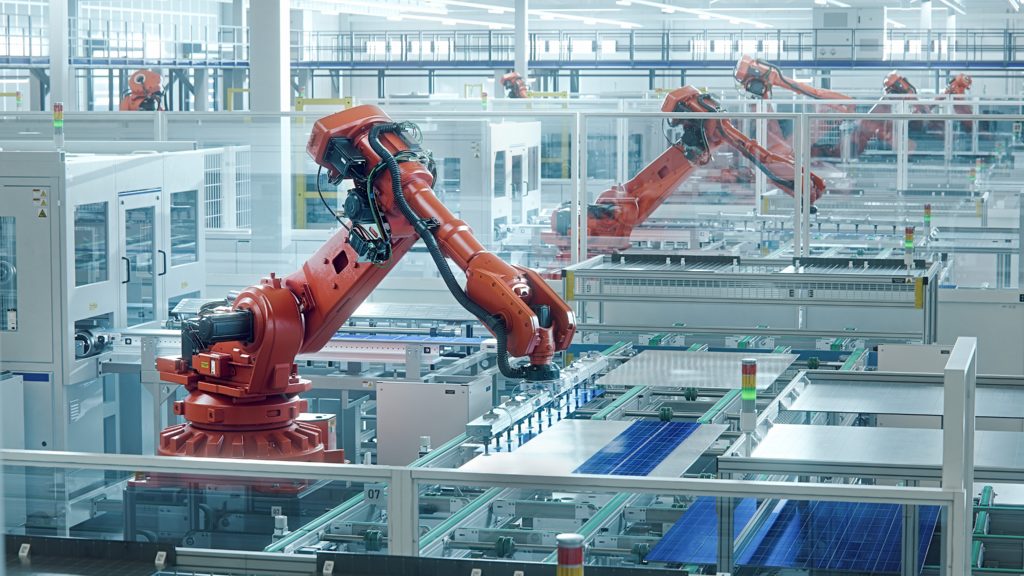
Factory automation can be defined as the digitisation of tasks within a machine environment, eliminating repetitive and mundane tasks for employees while simultaneously collecting valuable operational data. This automation process encompasses a range of components, including hardware, software, robots, sensors, and cloud environments for data storage, management, and analysis. By leveraging these technologies, businesses can not only save costs but also gain insights that enable process improvement.
Types of Factory Automation
Factory automation can take several forms depending on the specific requirements of a company. Let’s explore some of the common types of automation:
- Programmable Automation: This type of automation involves modifying software and machines to meet the customisation needs of different products. It is particularly useful for batch manufacturing, where products may have varying characteristics.
- Flexible Automation: Unlike programmable automation, flexible automation is customised based on the type of product being manufactured. This form of automation offers greater speed and versatility in execution.
- Fixed Automation: Fixed automation is employed for specific programming processes that do not require alterations to the product design. It is typically used in scenarios where the product remains unchanged throughout the manufacturing process.
- Integrated Systems: Integrated systems refer to the use of independent machines and processes that operate within the same plant. While these systems function autonomously, they work collectively to achieve production goals.
Advantages of Factory Automation
Integrating automation into factory operations provides numerous benefits for businesses. Let’s explore some of the key advantages:
- Increased Productivity
Automation dramatically enhances productivity by enabling factories to operate efficiently for extended hours, including round-the-clock production. By eliminating the need for manual intervention in repetitive tasks, businesses can optimise their manufacturing processes, ensuring faster order fulfillment and improved customer satisfaction.
- Cost Reduction
One of the primary advantages of factory automation is the potential for significant cost savings. By automating tasks, employees can focus on more strategic and creative activities, leading to reduced labor costs. Furthermore, analysing automated processes provides valuable insights into areas where waste can be eliminated, optimising resource allocation and minimising expenses.
- Energy Savings
Automation facilitates precise monitoring and control of electrical consumption within factories. By having real-time visibility into energy usage, businesses can identify areas of inefficiency and operate equipment accordingly. This proactive approach to energy management can result in substantial cost savings and contribute to a more sustainable manufacturing process.
- Adaptability
In an era of rapidly changing customer demands, adaptability is crucial for businesses to remain competitive. Factory automation enables companies to quickly modify their manufacturing processes to align with customer requirements. This flexibility helps businesses cater to evolving market trends, efficiently produce customised products, and stay ahead of the competition.
- Enhanced Occupational Safety
Automation plays a vital role in ensuring employee safety by eliminating the need for human intervention in hazardous tasks. By automating dangerous processes, businesses can minimise the risk of workplace accidents and injuries. This, in turn, creates a safer work environment and boosts employee morale and well-being.
The Relevance of Factory Automation in the Industry 4.0 Era
Factory automation aligns with the principles of Industry 4.0, a concept that emphasises the digital transformation of manufacturing plants to create smart factories or connected industries. Embracing automation empowers businesses to leverage emerging technologies such as Artificial Intelligence (AI), Digital Twins, and Cloud Computing. These technologies offer immense opportunities for improving productivity, optimising financial performance, enhancing employee satisfaction, and driving overall business growth.
At WrxFlo, we specialise in helping businesses automate their factory processes. Our expertise in technologies like AI, Digital Twins, and Cloud Computing allows us to deliver tailored solutions that enable businesses to harness the full potential of automation. Whether you need assistance in implementing sensor systems or leveraging IoT capabilities, our team is equipped to optimise data collection and derive meaningful insights. By harnessing the power of Artificial Intelligence and Machine Learning, we can help improve product quality, reduce production time, and drive operational excellence.
In conclusion, factory automation offers a multitude of advantages for businesses seeking to thrive in the modern industrial landscape. By embracing automation, companies can boost productivity, reduce costs, improve energy efficiency, adapt to changing customer demands, and enhance occupational safety. As we enter the era of Industry 4.0, the adoption of factory automation becomes increasingly vital for businesses aiming to stay ahead of the curve. Partnering with experts like WrxFlo can empower businesses to unlock the full potential of automation and drive sustainable growth in the digital age.
Are you ready to embrace factory automation and revolutionise your operations? Contact us today to embark on this transformative journey.








